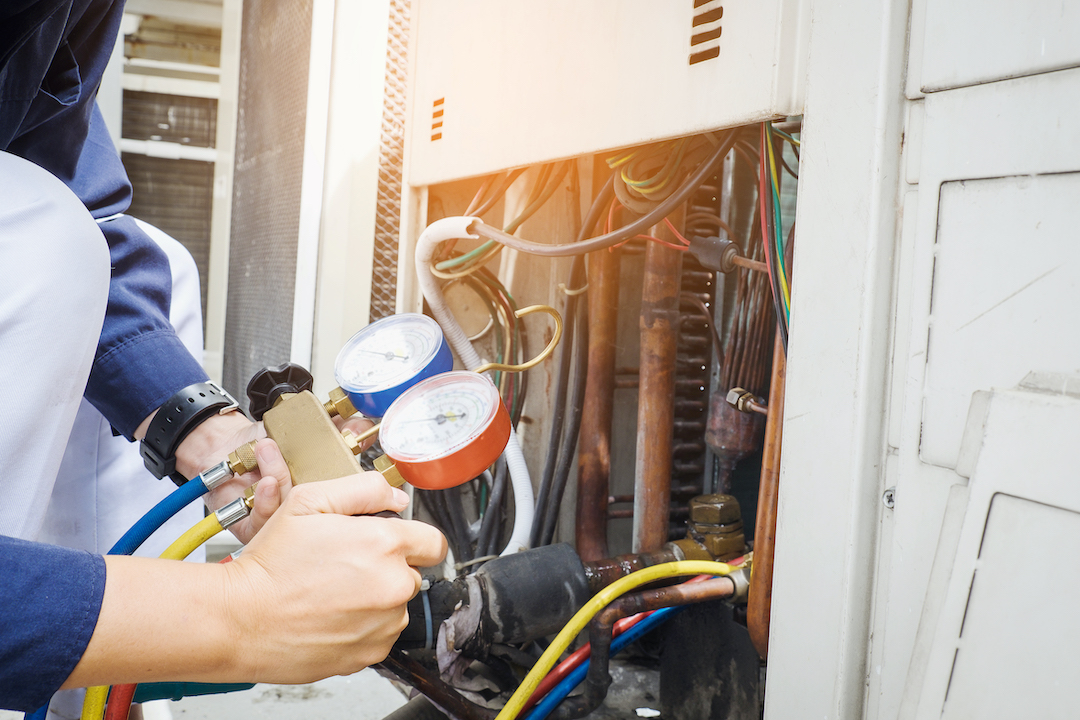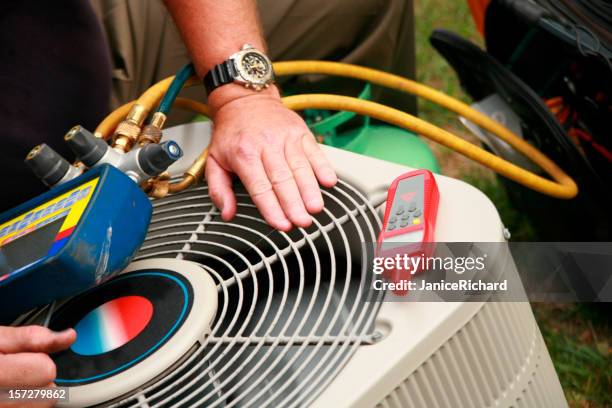Things to Know Before Your heat pump replacement ooltewah tn Starts
Things to Know Before Your heat pump replacement ooltewah tn Starts
Blog Article
Choosing In Between a Heatpump and Heating System: Key Factors To Consider for Your Cooling And Heating Needs
When evaluating home heating options for heating and cooling needs, the decision in between a heatpump and a heater can be intricate. Each system uses distinct benefits customized to particular climates and power effectiveness goals. Recognizing these differences is necessary for making an educated choice. Trick aspects such as installation expenses and environmental influence even more complicate the choice process. Which alternative really aligns with one's convenience and sustainability preferences? The complying with areas will explore these factors to consider carefully.
Understanding Warmth Pumps: Just How They Work and Their Advantages
While many homeowners think about different home heating alternatives, comprehending how warm pumps function and their advantages can greatly affect their decision. Warmth pumps operate by moving warm instead than producing it. In the winter months, they extract warmth from the outdoors air or ground and transfer it inside your home, while in the summer season, they reverse this process, cooling the home by eliminating heat outside. This dual performance makes them functional for year-round climate control.One of the main advantages of heat pumps is their energy effectiveness. They make use of considerably less power contrasted to conventional heating unit, possibly resulting in lower utility expenses (heat pump installation ooltewah tn). Additionally, heatpump have a smaller carbon footprint, making them an eco-friendly option. They additionally call for much less upkeep than traditional systems, contributing to long-term expense financial savings. In general, understanding the technicians and advantages of heat pumps can assist house owners make notified choices concerning their heating and cooling needs
Checking Out Heating Systems: Kinds, Procedure, and Advantages
Furnaces can be found in different kinds, including gas, electrical, and oil models, each with distinctive operational systems. Comprehending these differences is essential, as they impact performance and home heating performance. Furthermore, heaters use various advantages, such as consistent heat output and integrity in colder climates.
Sorts of Heating systems
Furnace can differ substantially in layout and procedure, with heaters being a preferred selection amongst property owners. There are several kinds of furnaces, each making use of different fuel resources and modern technologies. Gas heaters are typical, leveraging gas to produce heat successfully. Electric heating systems, on the other hand, use electrical resistance to create heat, often preferred for their straightforward installation. Oil furnaces, while less typical, are effective in areas with restricted gas accessibility (heat pump service). Furthermore, condensing furnaces make the most of energy effectiveness by reusing and capturing exhaust gases. Each kind operates via a system of warm exchangers and ductwork to disperse cozy air throughout a home. Recognizing the differences between these heating system kinds is important for educated heating and cooling choices
Advantages of Heaters
For home owners seeking trustworthy warmth throughout cold months, the benefits of heating systems are significant. Heating systems provide constant home heating, making sure even temperature levels throughout the home. They are specifically efficient in extreme chilly, commonly exceeding warm pumps in icy problems. Various kinds, including gas, electric, and oil furnaces, use adaptability to satisfy varied needs and preferences.Furnaces additionally have a tendency to have lower initial installation expenses contrasted to warm pumps, making them a more obtainable alternative for lots of. Their robust style adds to a longer life-span, with lots of systems lasting over 15 years with appropriate maintenance. Furthermore, modern-day heating systems are usually outfitted with advanced innovation for enhanced performance, which can result in minimized power expenses. Overall, furnaces stay a dependable option for effective home heating.

Energy Performance: Comparing Heat Pumps and Furnaces
When contrasting energy performance in between warmth pumps and heaters, the Seasonal Power Performance Ratio (SEER) plays an important duty in establishing performance. Furthermore, an operational expense evaluation reveals the long-lasting financial effects of each system. Comprehending these elements can direct property owners in making informed choices regarding their home heating solutions.
Seasonal Energy Performance Ratio
Energy efficiency plays an important role in the decision-making process between heatpump and heaters, particularly when considering the Seasonal Energy Efficiency Ratio (SEER) This statistics procedures the cooling efficiency of warm pumps over a whole cooling season, offering a standard means to assess efficiency. Higher SEER ratings indicate better power efficiency, converting to lower power consumption and lowered energy costs. On the other hand, heating systems are normally analyzed making use of the Yearly Fuel Application Effectiveness (AFUE) score, which shows home heating effectiveness. When contrasting these 2 systems, homeowners need to focus on SEER scores for heatpump, as they directly impact general energy cost savings and ecological sustainability. A comprehensive understanding of SEER can especially influence the long-lasting contentment and cost-effectiveness of the picked a/c option.
Operational Expense Analysis
Recognizing the operational costs related to heat pumps and furnaces is vital for house owners reviewing their options. Warmth pumps typically offer greater energy performance, converting electrical power right into warmth with minimal waste. This results in lower month-to-month utility costs, especially in modest climates. Alternatively, typical furnaces, particularly gas versions, might have reduced ahead of time prices but can incur higher operational expenses in time as a result of sustain prices and efficiency ratings.Moreover, heatpump can operate as both heating and cooling down systems, possibly reducing the requirement for separate HVAC devices. While preliminary investments for warmth pumps may be greater, their lasting cost savings in power performance can make them a more economical choice for numerous homes. Mindful evaluation of local energy prices is necessary to determine the ideal alternative.
Setup Prices: What to Anticipate for every Furnace
Setup expenses for heating systems can vary significantly between heatpump and heaters, influencing homeowners' decisions. Heat pumps usually have greater in advance setup costs, normally varying from $3,500 to $8,000, depending on the unit dimension and complexity of setup. This consists of the exterior unit, interior handling system, and required ductwork alterations. On the other hand, heating systems tend to have lower initial expenses, balancing between $2,500 and $6,000, which can be appealing for budget-conscious home owners. site web Installation expenses can enhance if comprehensive ductwork is required.Moreover, the option of fuel kind for heating systems-- all-natural gas, propane, or electric-- can additionally affect installation costs. While heatpump supply energy performance, their initial financial investment may hinder some customers. Ultimately, reviewing installment prices along with long-term financial savings and efficiency will aid home owners in making notified decisions about their heating systems.
Climate Considerations: Which System Executes Much Better in Your Location
How do environment conditions influence the performance of furnace? The performance of heatpump and heating systems can vary considerably depending upon the neighborhood climate. In modest environments, warmth pumps excel by efficiently transferring warm from the outside air, making them an energy-saving option. Their effectiveness decreases in incredibly cool temperatures, where they might battle to extract sufficient warmth. On the other hand, heating systems, specifically gas models, offer regular and reputable heat no matter exterior conditions, making them more effective in colder regions.In locations that experience milder winters, warm pumps can operate properly year-round, giving both home heating and cooling. In comparison, areas with extreme winter seasons usually benefit from the robustness of heaters. Eventually, understanding the regional environment is crucial when deciding in between a heatpump and a heater, as it directly influences their operational effectiveness and overall performance.
Upkeep Needs: Long-Term Take Care Of Warm Pumps vs. Furnaces
While both heatpump and heaters require routine upkeep to ensure peak efficiency, their details needs and care routines differ substantially. Heaters typically need less frequent focus, with yearly evaluations being sufficient to inspect for gas leakages, tidy filters, link and evaluate general performance. Their less complex layout commonly enables simple repairs.In comparison, heatpump require semiannual upkeep because of their dual function in heating and air conditioning. This consists of cleaning coils, examining refrigerant levels, and ensuring that both the indoor and outdoor systems function at their ideal. Additionally, heatpump maintenance typically entails even more complex parts, making specialist maintenance essential.Neglecting maintenance can cause diminished effectiveness and boosted power expenses for both systems. Inevitably, house owners should consider these lasting treatment demands when choosing in between a heat pump and a furnace, as positive upkeep can prolong the life expectancy and performance of either system significantly.
Environmental Influence: Picking a Sustainable Home Heating Choice
The environmental influence of heating systems is an important examination for house owners looking for lasting alternatives. Heat pumps are generally extra energy-efficient than standard heating systems, as they transfer warm instead than create it, greatly minimizing carbon exhausts. By utilizing sustainable energy sources, such as air-source or geothermal heat pumps, home owners can additionally minimize their ecological footprint.On the various other hand, gas heaters discharge greenhouse gases and contribute to air contamination, though they frequently give higher heat result. Nonetheless, developments in technology have actually resulted in read review the growth of high-efficiency heaters that minimize emissions.Ultimately, choosing a heating system involves weighing effectiveness against ecological impact. Homeowners are encouraged to review neighborhood power sources and motivations for renewable systems, guaranteeing an option that aligns with both personal convenience and environmental duty. The choice affects not just instant comfort yet likewise lasting sustainability and environmental health and wellness.
Frequently Asked Concerns
The Length Of Time Do Heat Pumps and Furnaces Usually Last?
The life expectancy of heatpump usually varies from 15 to 20 years, while heaters can last in between 15 to thirty years. Normal upkeep substantially influences their durability and performance in giving home heating solutions.
Can I Use a Warm Pump in Extremely Cold Climates?
Heat pumps can operate in incredibly cool climates, but their performance decreases as temperature levels decrease. In such conditions, extra heating resources may be necessary to keep comfortable indoor temperature levels and assure peak performance.

What Is the Noise Degree of Warmth Pumps Versus Furnaces?
The sound degrees of heatpump and furnaces differ considerably. Generally, heat pumps run even more quietly than conventional heating systems, making them more effective for those delicate to seem, while furnaces might create louder operational sounds during home heating cycles.
Are Warmth Pumps Suitable for Both Cooling And Heating?
Heatpump are certainly ideal for both home heating and air conditioning (furnace replacement). They work by transferring heat, providing effective temperature level control year-round, making them a flexible option for house owners looking for an all-in-one cooling and heating remedy
What Size Furnace Do I Required for My Home?
Identifying the suitable size furnace for a home calls for evaluating variables such as square video footage, insulation high quality, local environment, and the home's format. Consulting a specialist can guarantee a precise assessment and excellent comfort. Warmth pumps typically offer higher power effectiveness, transforming electric power right into heat with minimal waste. In moderate environments, warmth pumps stand out by efficiently transferring warmth from the outdoors air, making them an energy-saving alternative. On the other hand, heating systems, especially gas designs, give consistent and reputable warm no matter of exterior conditions, making them more effective in cooler regions.In locations that experience milder winter seasons, warm pumps can run properly year-round, supplying both heating and cooling. Warm pumps are usually more energy-efficient than standard heating systems, as they transfer heat rather than generate it, greatly lowering carbon exhausts. By making use of eco-friendly energy resources, such as air-source or geothermal heat pumps, house owners can even more reduce their environmental footprint.On the various other hand, natural gas furnaces emit greenhouse gases and contribute to air contamination, though they usually provide higher warmth output.
Report this page